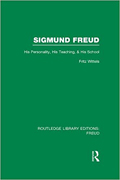Psychoanalysis > Papers |
Dram Interpretation and
the Psychoanalytic Dogma
By Jean Chiriac
What we can see from the spicy book Freud
written by Fritz Wittels is psychoanalysts' trend to interpret dreams starting from symbols and not from free associations
. Let's take for instance Monroe Meyer's example who explains a dream's significance connecting it to psychoanalysis cherished concepts and Stekel who
re-engages the interpretation in a different but not less scholastic manner. This temptation of ignoring the dreamer is also continued today. Thus, no matter where we find dreams interpreted from a psychoanalytical perspective we
are unable to get over the disgust of always referring to the sexual disturbed dogma.(1)
|
Mister Siegfried L., manager of a Swiss hotel is generally called Fritz L., so that his real name was forgotten. He is engaged to a young lady from Reichenberg, north of Bohemia, who considers Fritz is a charming name. Furthermore, by accident, he is telling her something about a certain Siegfried and she confesses she cannot stand this awful name.
Under these circumstances, the manager does not dare to reveal his real name. But at the City Hall
he will have to reveal it, and then, what will he tell to his bride?He cannot sleep that evening. He takes a book and he finds by accident (?) something about Frederic the Great campaign, the invasion of Bohemia, the battle of Lobositz. He finally falls asleep and he dreams:
The hotel lobby. The door opens and Frederic the Great enters, armed with his raven beak stick, looking around. Everybody runs and the dreamer looks at this scene from a distance.
Now, a new reference to the real happenings: the queen S. came at the hotel a while ago and she was awkwardly treated. It was known a certain ceremony was imposed, but, as nobody knew the etiquette, they all ran away and her majesty was left standing alone in the lobby.
This dream is very condensed too. The superficial meaning: almost no trace of Siegfried. Not just Fritz, but the great Fritz. Not just the named manager, but the undeniable owner of the hotel. Bohemia's invasion - the irresistible conquest of the girl from Bohemia. Effect of the dream: anxiety too. Because to the hero's courage is also connected his fear.
Behind the fear for the birth name another fear is hidden: the sexual inferiority is deeply hidden behind the name related inferiority.
It is impossible not to see in this very simple dream an attempt to overcome the fear created by the repugnance of revealing the real name, thing which is about to happen at the City Hall. The dream replaces the queen with a fearful and triumphant character who is the dreamer himself.(3) He thus comes back as the center of attention, someone against not even Bohemia (alluding to the future wife) can't resist. On the other hand, the memories related to the ceremony confusion when the queen showed up suggest as well the dreamer's desire that the ceremony should not take place - meaning of course the marriage ceremony. Thus, on the one side, the dreamer insures the conquest of his love as being Frederic the Great and, on the other hand, he cancels the marriage thus not being obliged to reveal his odious name.
Coming back to Wittels interpretation he says at the end that the dream is an allusion to the dreamer's sexuality. Probably seeing the stick of Frederic the Great as a symbol of genital male organ. It is highly unlikely that such an approach can be justified. On the other hand, it is an approach based on the same dogmatic plan we got used to by the Freudians.
I conclude by saying that if when we interpret a dream we do not come down immediately to the dogma we have the chance to discover the dreamer's complexes in the light of his own psychology which is not necessarily linked to, or at least not only to sexual interests.
But the interpretation issue becomes indigestible because it is much more difficult to look for what it really is than to pretend you already know what is, reducing everything to sexual symbolism, meaning to the dogma.
Notes:
1. Despite Freud's own opinion that not all the dreams treat sexual matters!
2. Fritz Wittels: Freud - His Personality, His Teachings and His School. The translation of the quote is from Romanian version.
3. The name Fritz is a short form of the name Frederick.
Copyright 2002-2024, AROPA. All rights reserved.
